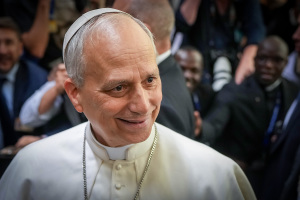China drafts new rules cracking down on citizens' religious exchanges with foreigners

The Chinese Communist Party has drafted strict new rules preventing foreigners in the country from discussing religion with locals, a move experts say will make practicing belief far more difficult.
This week, China’s Ministry of Justice published a list of new restrictions on religious foreigners who are visiting or working in the communist country to prevent them from spreading so-called "religious extremism," or use religion "to undermine China's national or ethnic unity."
The draft rules include a list of activities that foreigners are advised not to conduct within China, such as "interfering with or dominating the affairs of Chinese religious groups," advocating "extremist religious thoughts," using religion to conduct terrorist activities, or "interfering with the appointment or management of Chinese clergy members."
Foreigners are also prohibited from “illegal preaching among Chinese citizens, converting new believers, accepting religious donations from Chinese citizens,” or “carrying out religious education and training.”
Additionally, the new rules stipulate that foreigners who intend to organize collective religious activities in temples, mosques or churches must first submit a “written application” to the religious group in the city, supervised by official organizations such as the Protestant Three-Self Patriotic Movement or the Buddhist Association of China.
The rules are the latest crackdown on organized religion in China under President Xi Jinping, who has repeatedly called for the "sinicization" of religion.
In an op-ed for religious liberty magazine Bitter Winter, editor Massimo Introvigne said the draft law clearly shows that China is “afraid of foreigners coming to the country to discuss religion in every capacity.”
“For clergy, and anybody else, to visit China and hold, or participate in, a worship meeting, lecture, or simply discuss religion with Chinese colleagues is submitted to a large and even bizarre number of authorizations from different bureaus, offices, and administrations,” he said, adding that it is “extremely difficult” to obtain these authorizations.
Though officially an atheist state, the Communist government recognizes five official faiths: Chinese Buddhism, Taoism, Islam, Catholicism, Protestantism. However, all religions are overseen by the CCP’s United Front Work Department.
Religious practice outside these state-sponsored groups is strictly controlled. Underground churches and private religious study groups are considered “illegal” and routinely shuttered, fined, or turned into propaganda centers promoting the Communist Party’s ideologies.
In addition to Christians, China has long been accused of engaging in human rights crimes, and even genocide, against other religious minority groups, including Uighur Muslims, Falun Gong practitioners, and Tibetan Buddhists.
Rian Thum, an expert on Islam in China at the University of Nottingham, told CNN the new rules reflect a "longstanding fear of foreign pollution, which has become more important in the current climate."
"I was struck by the repeated use of the phrase 'China's religious independence,' which points to the nationalist desire to purify religions of 'foreign' influences," he said. "The regulations look like an effort to seal off Chinese religious practitioners from their fellow believers outside the country. Even lectures by visiting religious figures would require a bureaucratic permissions process that would dissuade most visitors."
The notice to solicit public opinion for the rules was initially released by the Ministry of Justice on its website on Wednesday and the deadline to comment is Dec. 17. However, Bitter Winter notes that normally, these “comments” do not alter significantly a draft law coming from a State agency, “except that sometimes they make it worse.”



























